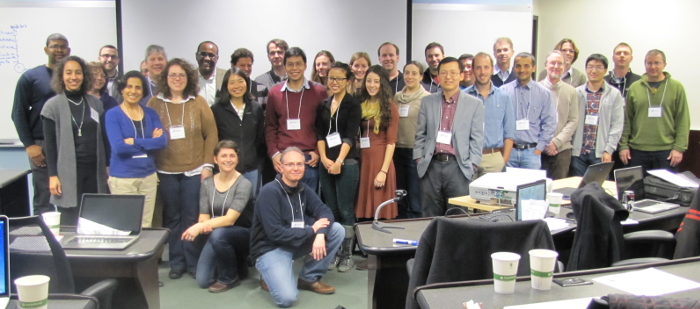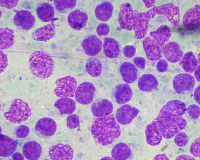| Description | Participants | Agenda | Summary | Products |
|---|
NIMBioS Investigative Workshop
Lymphoid Cells in Acute Inflammation

Topic: Lymphoid cells in acute inflammation: Current evidence and role of modeling
Meeting dates: January 15-16, 2015
Location: NIMBioS at the University of Tennessee, Knoxville
Organizers:
Judy Day, Mathematics, Electrical Engineering & Computer Science, Univ. of Tennessee
Yoram Vodovotz, Director, Center for Inflammation & Regenerative Modeling, Univ. of Pittsburgh
Objectives: The Acute Inflammatory Response (AIR) to infection or traumatic injury has largely been characterized by the actions of complement, immune cells such as macrophages and neutrophils, and the inflammatory mediators they produce. Recent advances have highlighted the early and important role of regulatory T cells and innate lymphoid cells in the AIR, and these findings have begun to alter the perception that effects on lymphoid cells occur later in the response to infection or injury. Along with the biological advances in the area, mathematical modeling studies have highlighted the dynamic nature of the AIR, and have pointed toward the need to consider lymphoid cells in order to explain key biological phenomena as well as impacting clinical translation. This workshop aims to survey and organize what is currently known about the role of lymphoid cells and their mediators in the AIR, how the role of lymphoid cells may differ in acute inflammation due to infection versus traumatic injury, and efforts at computational modeling of the AIR. Implicit in this aim is the goal of determining what relevant experimental datasets are available and how best to use them for the modeling efforts.
This workshop will inspire new primary research collaborations between those who have not had the opportunity to work closely with researchers developing and using computational methods to investigate biological questions. Likewise, those whose expertise is in modeling and computational methods will be able to establish connections with experimental or theoretical immunologists. The workshop should foster new collaborations by highlighting the benefits of interdisciplinary efforts in answering fundamental questions in immunology.
Live Stream. Presentations were available for viewing via live streaming during the workshop.
Playlist of archived presentations![]()
 Summary Report.
The focus of this NIMBioS workshop was predicated by insights derived from nearly 15 years of computational modeling of the acute inflammatory response (AIR). Co-organizers Day and Vodovotz are both long-term collaborators and have worked for over a decade on computational modeling of the AIR. Initial modeling studies of the role of T cells in experimental AIR carried out by Day and Vodovotz pointed toward the need to consider lymphoid cells in the AIR; however, the experimental evidence was underdeveloped at the time. This workshop aimed to survey and organize what is currently known about lymphoid cells and their mediators in the AIR, how the role of lymphoid cells may differ in acute inflammation due to infection versus traumatic injury, and the computational modeling efforts of AIR. A few key background lectures were given the first morning by Timothy Billiar, Yoram Vodovotz, and Arup Chakraborty. For the remainder of the workshop, discussions in small focus groups or with all participants were organized around three focus areas: biology and data, led by James Lederer; computational modeling, led by Thomas Kepler; and clinical translation, led by Timothy Billiar and Arup Chakraborty. The participants were enthusiastic about maintaining the momentum from this initial workshop in various ways, and shortly after the conclusion of the workshop, a scientific committee was formed to guide and initiate future interactions. These future interactions include:
Summary Report.
The focus of this NIMBioS workshop was predicated by insights derived from nearly 15 years of computational modeling of the acute inflammatory response (AIR). Co-organizers Day and Vodovotz are both long-term collaborators and have worked for over a decade on computational modeling of the AIR. Initial modeling studies of the role of T cells in experimental AIR carried out by Day and Vodovotz pointed toward the need to consider lymphoid cells in the AIR; however, the experimental evidence was underdeveloped at the time. This workshop aimed to survey and organize what is currently known about lymphoid cells and their mediators in the AIR, how the role of lymphoid cells may differ in acute inflammation due to infection versus traumatic injury, and the computational modeling efforts of AIR. A few key background lectures were given the first morning by Timothy Billiar, Yoram Vodovotz, and Arup Chakraborty. For the remainder of the workshop, discussions in small focus groups or with all participants were organized around three focus areas: biology and data, led by James Lederer; computational modeling, led by Thomas Kepler; and clinical translation, led by Timothy Billiar and Arup Chakraborty. The participants were enthusiastic about maintaining the momentum from this initial workshop in various ways, and shortly after the conclusion of the workshop, a scientific committee was formed to guide and initiate future interactions. These future interactions include:
- Organizing a follow-up meeting that includes a larger audience and external/corporate funding
- Submitting a proposal for a NIMBioS Working Group(s) (/workinggroups/)
- Applying for American Institute of Mathematics (AIM) activities
- Soliciting input from the broader scientific community via a WordPress site
One of the main points reiterated during the workshop was the recognition that long-term and close collaborations among clinicians, bench scientists, and computational modelers is essential to inevitably seeing successful translation of these ideas into clinical practice as well as deriving novel mechanistic hypotheses for further basic science studies.
Products:
Day JD, Cockrell C, Namas R, Zamora R, An G, Vodovotz Y. 2018. Inflammation and disease: Modelling and modulation of the inflammatory response to alleviate critical illness. Current Opinion in Systems Biology 12:22-29.
[Link]
NIMBioS Investigative Workshops focus on broad topics or a set of related topics, summarizing/synthesizing the state of the art and identifying future directions. Workshops have up to 35 participants. Organizers and key invited researchers make up half the participants; the remaining participants are filled through open application from the scientific community. Open applicants selected to attend are notified by NIMBioS within two weeks of the application deadline. Investigative Workshops have the potential for leading to one or more future Working Groups. Individuals with a strong interest in the topic, including post-docs and graduate students, are encouraged to apply. If needed, NIMBioS can provide support (travel, meals, lodging) for Workshop attendees, whether from a non-profit or for-profit organization.
A goal of NIMBioS is to enhance the cadre of researchers capable of interdisciplinary efforts across mathematics and biology. As part of this goal, NIMBioS is committed to promoting diversity in all its activities. Diversity is considered in all its aspects, social and scientific, including gender, ethnicity, scientific field, career stage, geography and type of home institution. Questions regarding diversity issues should be directed to diversity@nimbios.org. You can read more about our Diversity Plan on our NIMBioS Policies web page. The NIMBioS building is fully handicapped accessible.
NIMBioS
1122 Volunteer Blvd., Suite 106
University of Tennessee
Knoxville,
TN 37996-3410
PH: (865) 974-9334
FAX: (865) 974-9461
Contact NIMBioS


